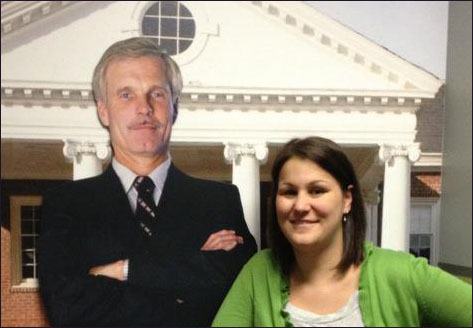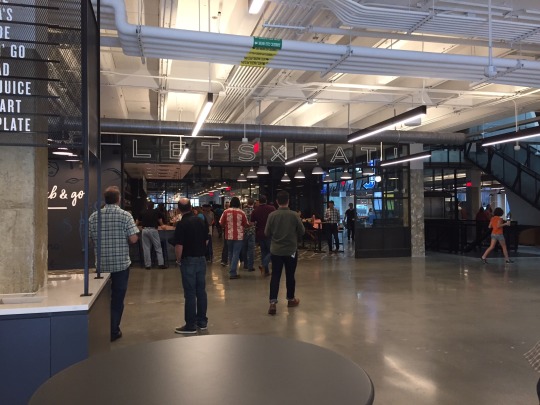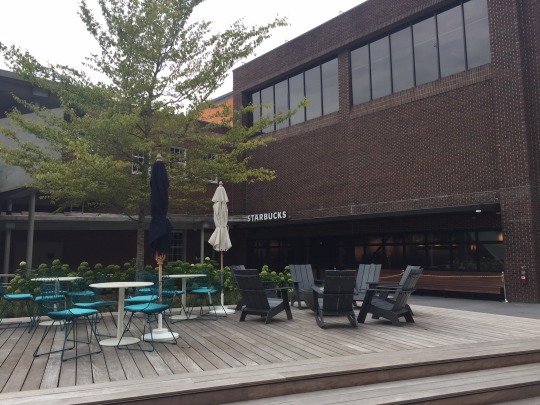#as previously stated my philosophy regarding the art of more fan works is that if no one else will make it i kind of have to
Explore tagged Tumblr posts
Text







#as previously stated my philosophy regarding the art of more fan works is that if no one else will make it i kind of have to#sorry that a lot of these were arthur. also i may have been too mean to ashbel.#the art of more#arthur davenport#gonzalo silas#graham connor#hassan al afshar#ashbel whitman#roxanna whitman#noteshipping#artshipping#aaaand scene
3 notes
·
View notes
Text
Going Back to Turner. (I Don’t Think So.)

"Would you like to have lunch this Friday at the Market?"
Out of context, this seems like a perfectly ordinary question from my husband. So why did it first hit me with a brief pang of dread?
Because "The Market" isn't a quaint little Midtown café to meet for a sandwich. It's the name of the new food court at Turner, part of a large-scale, high-budget renovation of the campus. And eating there would be my first time back at Techwood outside of the annual family Halloween party, during a regular work day like the thousands I'd had there myself.
But nearly five years (!) after leaving, was I really still nervous about visiting? Had I really not moved past it? What was wrong with me?
Alan had mentioned a few weeks ago that the menu at one of the stations that day had been especially good: a Texas buffet of chicken-fried chicken, beef brisket, jalapeno mac and cheese, and chili cheese fries. They were having that theme again on Friday, so he thought it'd be a good chance for me to come try it and see the new Market, along with all of the other changes at Turner.
I know he knew it'd be a little tough for me, even if I didn't say so, and the invitation was a thoughtful gesture for him to make. And I knew if he was there with me, that's what really mattered. So I said yes.
It was admittedly strange to be pulling up to the gate on the Visitors side, to have the security guard sternly ask for my ID. When he returned with my parking pass, he asked, "Have you been here before?"

As soon as we started walking across campus, it felt familiar, but not. Muted blue and steel gray Adirondack chairs line the front lawn. The landscaping is clean and crisp. In one shady spot, there's a brand-new hammock.
We climbed the steps up to the redesigned main courtyard, which I'd seen in progress last October but was now finished, in more than one sense of the word. The space has a shiny coat on it, like it's still fresh from the packaging. It almost feels like I imagine couples on HGTV shows feel after the makeover: Everything is beautiful and pristine, and you're afraid to actually use any of it.

The old Turner was the lived-in family room that was sort of a mess, but it was your mess. Everything was a little dated and well-worn, but you knew where your spot was, and everyone else did, too. It wasn't designed for guests--it's where you and your group could feel comfortable and just be yourselves. And with that confidence, people created sharp, original work, buoyed by the grateful disbelief that you got to come in and do this everyday.
Alan and I made our way to the Market, which feels not only like you've left Techwood, but Atlanta entirely. By design, it has the same New York/Chelsea Market vibe that Atlanta's own Ponce City Market is trying to capture. (One former coworker even referred to it as "TCM--Turner City Market.")

As with the courtyard, it was hard to believe this was the exact same amount of space that had existed previously. It was the reverse of when you go back to your old high school and realize how small everything looks. Here I thought, Was it always this big?
Then I wondered if maybe it was me who was smaller. In my peak days at Turner, I felt in charge--of my team, of my work, of my experience each day. I could glide through campus with the ease of someone who knew the layout like the back of my hand, greeted with each step by someone I knew and who knew me. It was the Cheers theme song in real life.
After lunch, Alan took me to see the redesigned 1010 building, which traditionally had been the anchor building of the campus, housing the old Station Break cafeteria and the bulk of the network floors. Now it's home to sleek conference rooms and modern meeting spaces straight from the lobby of a five-star hotel.
As we walked, I flashed back and saw ghostly images from the past overlaid on the new structures. I saw all of Cartoon Network gathered around the staircase as the former president, Betty Cohen, led us in a toast to the fact we had been the No. 2 kids network for six weeks straight. I saw the TV that had been set up to showcase what the cutting-edge new technology of HD looked like. I saw Bill Burke, former head of TBS, announcing to a gathered crowd in the lobby that the network had acquired reruns of Seinfeld--"and we'll be starting bake sales to pay for it." I clearly remember him saying those episodes would start airing in 2002 and thinking that sounded so. far. away.
Later, when TBS picked up Sex and the City, the network internally used the tagline "From Mayberry to Manhattan" to signify its evolution from old, nonstop episodes of The Andy Griffith Show to a young, buzzy show from the prestigous halo of HBO.
Today, Turner as a whole embodies the sentiment. The small-town, familial nature of the old culture was simultaneously its strongest appeal and its biggest weakness, as comfort became complacency. The new leadership was tasked with changing all that and reinvigorating the image of Turner, and in that regard, they've succeeded.

The more I've thought about my visit over the past couple of days, the more I've realized my issues are really not about Turner. To paraphrase Carrie Bradshaw, I couldn't help but wonder: Was I sad about Turner's big changes… or about my own?
The fact is, I've been feeling old lately. After everything I went through with my mom, I know rationally that "Aging is a privilege," but it doesn't change the fact that I am, indeed, aging. Because my career at Turner, from age 22 to 36, essentially defined my young adulthood, I have to confront the fact that it's not necessarily Turner I miss, but that phase of my life.
I remember back in the late '80s when I was growing into my Cubs fandom, my dad and I would evaluate each season's team. Each year, there was one player, Shawon Dunston, who I'd say "has a lot of potential." By the 4th or 5th season I said this, my dad replied, "How many years can he have potential? At some point, you have to admit he's just an average player."

For some reason, this has always stuck with me, and I recalled it again this weekend. My years at Turner and Cartoon Network represented potential, the start of a career path that could reach unlimited heights. What did it mean that my climb led to a plateau, then eventually to me jumping back down to the bottom?
Then I came back to my mantra that I am not my job. I have value and worth independent of what I did or didn't do at Turner. One of my friends on Facebook, another CN alum, pointed out that the bulk of the work we did there was ephemeral. Nobody remembers the promo he cut for the show that got canceled a year later. The clever tagline I wrote for a new series now exists only as a screenshot on my laptop. Ultimately, to paraphrase my friend, it's not the work that shapes your experience, but the experience of doing the work that shapes who you are.
I'm a big fan of the "You Made It Weird" podcast hosted by comedian Pete Holmes. While the focus is primarily on talking with fellow comedians about comedy, Holmes infuses his interviews with the big questions about life, death, religion and philosophy.
He had one episode with Deepak Chopra in which Chopra talked about the importance of presence and living in the moment, since we live in a state of constant change. Chopra talked about how our own bodies are not the same ones we had even a few days ago, as our cells are constantly dying and being regenerated. When you think back on your past, think about how right now you're physically made up of 100% new matter than you were back then.
Rather than sharing this fact to freak us out, Chopra encourages us to embrace it as proof that meaning comes in mindfulness, that only by appreciating what's currently in front of us can we find real peace. And that if your current situation doesn't bring you happiness, you can rest assured that change not only is possible, but inevitable.
So I decided this weekend to take a moment to reflect on who I am--not who I was or who I'm "supposed" to be.
I am alive. I am healthy. I am Archie's mom. I am in a kind, loving marriage. I am part of a caring family. I am worthy of love and happiness. I am capable of love and happiness. I am kind. I am curious. I am observant. I am a writer. I am only responsible for doing my best, not for being perfect. I am someone who enjoys making people laugh. I am welcome among the right group of people. I am not concerned with the wrong people. I am not always good at knowing who the wrong people are. I am trying to have faith that people usually have good intentions. I am focused on building positivity. I am becoming less tolerant of negativity. I am in control of how I respond to what I cannot control. I am doing work I enjoy. I am good at the work I do. I am happy to work with the people I work with. I am financially stable. I am creating a home for Archie. I am mentally healthier now than I was five years ago. I am healthy. I am alive. I am here. I am happy.
In truth, there is no "top" or "bottom" of the climb, because there is no climb. Nobody is tracking your progress, and those who are don't need to be part of your life. We're all just putting one foot in front of the other, every day. Even when it feels like you're being pushed or pulled in a direction you don't want to go, you're the one taking your own steps and reshaping your path into a place where you feel right.
As I get older, I'm increasingly happier on my own path, less tempted to look over to see if someone else's looks better. And when I'm unsure of what's ahead and turn around to go backwards, it's not a path to the past I see. It's the people who love me now--family and friends, old and new--forming a wall of support and assuring me they're the real force that will keep me safe going forward, and not the false security of nostalgia. They are solid and true. They will protect me and catch me. The past is art on the walls: comforting, inspiring, but ultimately an illusion, a curated image of something that existed at a moment in time--or may not have even existed at all.
One of the saddest ironies of losing my mom is not being able to tell her all the lessons I'm learning from processing the grief of her passing. So many of her quotes and cliches and sayings echo through my head daily, and occasionally one snaps into place as I suddenly understand exactly why she said it. I remember when she gave me this print as a gift and not getting why she thought it was so important. Now, as I look down the foggy road of what my future holds, her message is coming through loud and clear.

1 note
·
View note
Text
Endings

Why I don't interpret my story endings.
I'll start this off by stating that there are no spoilers in what I'm about to write. Recently I started receiving emails and questions regarding the ending of my two novels, The Strands and In the Shadow of the Witch (more for In the Shadow of the Witch). These questions always loop back to asking me what the ending meant. Good question. But not one I felt I should answer. Why? I'll try to explain.
In my experience when the creator of a piece of art, whether it be fiction, poetry, painting, movies, music, etc. explains the meaning of their art it is coming from a place of authority. At least that is how I, as a member of the listening, viewing and reading public, interpret it. This tends to change my original impressions of the artwork. Sometimes this can be good, but often I preferred how I thought or felt prior to learning of the creator's interpretation. I enjoy reading blogs or other material from fans because I view those comments as opinion and interpretation. This material can often expand my perception of the original and allows me to see it from a different perspective or adds an additional dimension I hadn't noticed previously. But if the creator gives me his/her interpretation then it all of a sudden becomes concrete. Somehow the artwork loses its malleability along with the ability to offer multiple interpretations. I realize this is a very personal reaction but it does influence how I deal with and talk about my own creative endeavors.
There is another reason I shy away from answering questions about the meaning of events or endings in my novels. It is one I am loathe to admit. I don't know the answer. For those of you who have read previous posts or Dark Tunes, I've talked about how I often find myself a traveler in the world of the story. I become a chronicler, trying to understand what is happening and attempting to draw a map as I walk through the territory. At times I interject my own personality, philosophy and ideas into the story but much of what I write grows organically from my imagination, the creative process, and from putting pen to paper.
The original ending of, The Strands, included additional pages of material in which I gave my interpretation of the ending through the use of the omniscient narrator. Something felt wrong. After long and hard internal deliberation, I removed the additions. The thought that kept occurring to me was, who am I to say what this means? How do I know what this may mean to a reader coming to the story with different life experiences and knowledge? The truth is, I didn't know what it meant when I wrote it and only after examining it for a time did I form an opinion and then attempt to include it in the novel. Interpreting on behalf of the reader felt wrong.
More people have questioned me about the ending of, In the Shadow of the Witch than The Strands. What does it mean? What exactly happened between Trevor and the Witch? There is a part of me that wants to share my feelings on the topic but a deeper part of me wants each reader to decide what it means to them, not for me to detail what it meant for me.
One of the greatest gifts I've received since publishing my work has been the interaction I've had with readers talking to me or emailing me and explaining what the story meant to them and their interpretation of what occurred and what they thought about the novel. I then get to re-examine the novel through their eyes and the story then takes on new life, new meaning, and continues on.
I thank those of you that have taken the time to reach out to me to share your thoughts and questions about the novel. If I didn't answer your questions directly it is because I felt it was my responsibility not to. But please keep them coming. I enjoy the thoughts they provoke and the shifts in perception they bring about.
We all have a story and I hope yours begins where mine ended.

0 notes